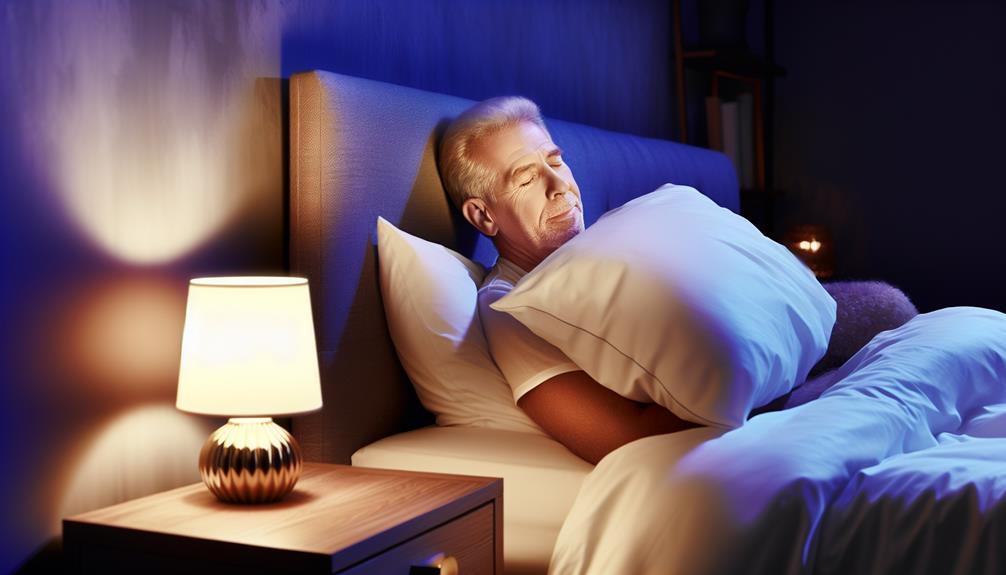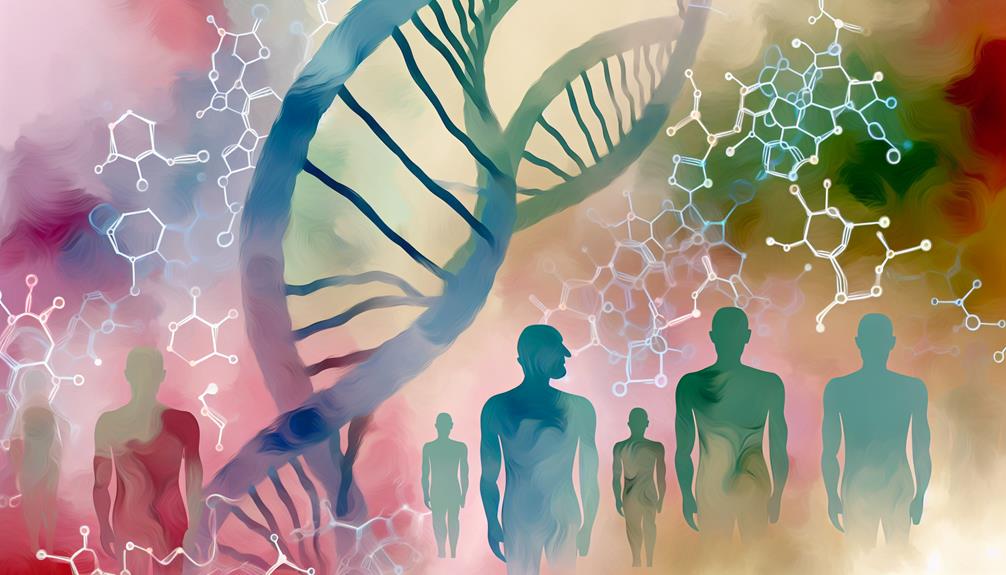As I examine aging's role in male hormonal imbalance, I find that the decline in testosterone production, typically starting around age 30, greatly impacts health. This decrease often results in elevated estrogen levels, leading to weight gain and mood disturbances. Additionally, various factors, such as lifestyle choices, chronic stress, and environmental pollutants, exacerbate these hormonal shifts. Biological aging alters cellular function and receptor sensitivity, complicating hormonal balance further. Understanding these interconnected influences is essential for addressing related health challenges, and there's much more to explore on how we can mitigate these effects for better well-being.
Understanding Hormonal Imbalance

Hormonal imbalance in aging men can be likened to a delicate scale, where fluctuations in hormone levels can lead to significant health implications. The endocrine system, responsible for hormone production and regulation, is particularly susceptible to the aging process. As I've explored deeper into this subject, I've realized how vital hormonal feedback loops are in maintaining homeostasis. When these feedback mechanisms falter, it can result in an array of symptoms, including fatigue, mood swings, and decreased libido.
Testosterone, a key hormone for men, typically declines with age. This decline isn't merely a straightforward decrease; it involves complex interactions within the endocrine system. The hypothalamus, pituitary gland, and testes collectively regulate testosterone production through intricate hormonal feedback signals. As I've observed, when testosterone levels dip, the body compensates by altering the release of other hormones, such as luteinizing hormone and follicle-stimulating hormone, attempting to restore balance.
However, the aging process can disrupt this finely tuned system. For instance, an increase in estrogen relative to testosterone can emerge, leading to symptoms like weight gain and mood disturbances. Additionally, factors such as stress, obesity, and chronic illness can further exacerbate hormonal imbalances. It's essential to understand that as we age, our bodies' ability to adapt to these changes diminishes, making it essential for men to monitor their hormonal health actively and consult healthcare professionals when experiencing symptoms related to hormonal imbalance.
The Aging Process Explained
As I examine the aging process, it becomes clear that biological changes notably affect hormonal production in men. This decline in hormones can have profound implications for overall health and well-being. Understanding these dynamics is essential for addressing the challenges that accompany aging.
Biological Aging Changes
Biological aging changes are a complex interplay of genetic, environmental, and lifestyle factors that gradually affect our bodies over time. As I observe the aging process, I can't help but notice how these changes manifest at a cellular level. One critical aspect is cellular senescence, where cells lose their ability to divide. This accumulation of senescent cells contributes to tissue dysfunction and alters hormonal signaling pathways.
Hormonal receptors, which are essential for the proper functioning of our endocrine system, also undergo modifications with age. These changes can lead to decreased sensitivity to hormones, further complicating the hormonal balance.
Here's a concise overview of some biological aging changes:
| Aspect | Description |
|---|---|
| Cellular Senescence | Accumulation of non-dividing cells affecting function |
| Hormonal Receptors | Changes in sensitivity and responsiveness |
| Tissue Functionality | Decline in homeostasis and repair mechanisms |
| Genetic Factors | Variability in DNA repair and cell maintenance |
Understanding these biological aging changes can help us appreciate the underlying mechanisms that contribute to hormonal imbalance in aging men.
Hormonal Production Decline
With age, the production of key hormones begins to decline, greatly impacting men's overall health and well-being. This decline is particularly evident in hormones such as testosterone, which plays an essential role in numerous physiological functions. As the endocrine system ages, it becomes less efficient in producing these hormones, leading to a cascade of potential deficiencies. Research indicates that testosterone levels can decrease by approximately 1% each year after the age of 30, which can notably alter bodily functions.
The implications of this hormonal decline are profound. It can affect muscle mass, energy levels, and even mood. While some may consider hormonal therapies as a potential remedy for these imbalances, it's essential to approach this option carefully. Hormonal therapies can offer relief but come with risks and side effects, making it imperative to consult healthcare professionals before starting any treatment.
Understanding the mechanics of hormonal production decline is essential for anyone traversing the aging process. By recognizing how our endocrine system changes, we can better address the challenges that arise and explore appropriate interventions to maintain our health and vitality.
Impact on Health
The impact of hormonal decline on health becomes increasingly apparent as men age, influencing various aspects of physical and mental well-being. I've observed that decreased testosterone levels often correlate with a range of health issues, including diminished energy, muscle mass, and libido. These changes can lead to significant mental health challenges, such as depression and anxiety, which I've seen affect not only the individual but also their relationship dynamics.
For instance, lower testosterone may contribute to mood swings or irritability, disrupting communication and intimacy in partnerships. This shift in emotional response can create a cycle of misunderstandings and conflict, further exacerbating mental health struggles. I find it essential to highlight that these hormonal imbalances can hinder the ability to engage in healthy relationships, leading to isolation or withdrawal.
Moreover, the physiological effects of aging and hormonal decline can impact self-esteem, compounding feelings of inadequacy. As men navigate these challenges, it's essential to recognize the interconnectedness of physical health, mental health, and relationship dynamics. Addressing these issues holistically can foster better outcomes for aging men, enhancing both their quality of life and their connections with others.
Testosterone Decline Over Time

As men age, they often experience a gradual decline in testosterone levels, a phenomenon that can considerably impact various aspects of health. This decline typically begins in the late twenties and continues at an average rate of about 1% per year after the age of 30. Consequently, many men find themselves grappling with symptoms such as fatigue, decreased libido, and diminished muscle mass. Understanding this decline is essential for addressing its potential implications.
Testosterone plays an important role in several physiological processes, including the maintenance of bone density, muscle strength, and overall energy levels. The decline in testosterone can lead to increased body fat, mood fluctuations, and even cognitive decline. As I analyze this issue, it becomes apparent that the need for intervention, such as testosterone therapy or hormone replacement, grows more significant for some men as they age.
Testosterone therapy can help restore hormone levels to a more favorable range, potentially alleviating symptoms and improving quality of life. However, it's essential to approach this treatment cautiously, as it's not without risks. Side effects may include an increased risk of cardiovascular problems and prostate issues. Therefore, men considering testosterone therapy should engage in thorough discussions with their healthcare providers, weighing the potential benefits against the risks.
Impact of Lifestyle Choices
Numerous lifestyle choices profoundly influence hormonal balance and overall well-being in aging men. I've observed that exercise habits play a crucial role; regular physical activity enhances testosterone levels and helps with weight control. In contrast, sedentary lifestyles can lead to hormonal deficiencies. Alcohol consumption also warrants attention; excessive drinking is linked to lower testosterone and increased estrogen levels, which can exacerbate hormonal imbalances.
Moreover, the smoking effects cannot be overlooked. Research indicates that smoking negatively impacts testosterone production, thereby contributing to hormonal disparities. Stress management is another essential factor; chronic stress elevates cortisol levels, which can inhibit testosterone synthesis. I've found that effective stress reduction techniques, such as mindfulness or yoga, can mitigate these effects.
Social interactions considerably affect mental health and hormonal stability. Engaging in meaningful relationships can provide emotional support, which is essential for maintaining hormonal balance. On the other hand, inadequate social engagement can lead to increased stress and decreased well-being.
Caffeine intake, while often viewed as a harmless stimulant, may also play a role in hormonal health. Excessive caffeine can disrupt sleep routines, leading to fatigue and hormonal irregularities. Quality sleep is crucial for hormonal regulation; disruptions in sleep can hinder testosterone production.
Nutrition and Hormonal Health

In examining the relationship between nutrition and hormonal health, I find it critical to evaluate the essential nutrients required for ideal hormone production. The impact of processed foods on hormonal balance cannot be overlooked, as these often lack crucial nutrients and contain harmful additives. Additionally, proper hydration plays a significant role in maintaining hormonal equilibrium, affecting everything from metabolism to mood regulation.
Essential Nutrients for Hormones
Essential nutrients play an important role in maintaining hormonal balance, especially as we age. I've come to appreciate how important specific nutrients are, particularly essential fatty acids and vitamin D, in supporting hormonal health. Essential fatty acids, such as omega-3 and omega-6, are integral to the production of hormone-like substances called eicosanoids. These compounds influence inflammation, immunity, and even mood stability, which can considerably affect our overall hormonal environment.
Moreover, vitamin D's role in hormone regulation cannot be overstated. It functions not just as a vitamin but as a prohormone that influences the expression of several genes linked to hormone production. Research shows that adequate vitamin D levels are associated with improved testosterone levels in men, which is essential for maintaining muscle mass, libido, and overall vitality.
As I navigate the complexities of aging, I realize that incorporating foods rich in these essential nutrients into my diet is important. This includes fatty fish, nuts, seeds, and fortified foods for vitamin D. By prioritizing these nutrients, I can help support my hormonal health and mitigate some effects of aging, ultimately enhancing my quality of life.
Impact of Processed Foods
While focusing on nutrient-rich foods is essential for maintaining hormonal balance, the role of processed foods in our diets can't be overlooked. I've noticed that the processed food effects can notably impact our hormonal health, often leading to dietary inflammation. This inflammation can disrupt hormone production and regulation, particularly testosterone, which is vital for male health.
Here are a few key ways processed foods can affect us:
- High Sugar Content: Excessive sugar can lead to insulin resistance, which may alter testosterone levels.
- Trans Fats: Common in many processed snacks, these fats can promote inflammation and negatively impact hormone function.
- Chemical Additives: Preservatives and artificial ingredients can disrupt endocrine function, further contributing to hormonal imbalances.
Role of Hydration
Hydration plays an essential role in maintaining hormonal balance, impacting various bodily functions, including hormone production and regulation. I've observed that inadequate hydration can lead to hormonal fluctuations, particularly in men, where testosterone levels can be affected. The hydration benefits extend beyond just quenching thirst; proper fluid intake is critical for ideal physiological processes.
When the body is dehydrated, it can trigger stress responses that elevate cortisol levels, a hormone that, when chronically elevated, can negatively influence testosterone. Implementing effective hydration strategies is essential. I recommend aiming for at least 3.7 liters of total fluid intake daily, which can include water, herbal teas, and hydrating foods.
Additionally, incorporating electrolytes can enhance hydration efficiency, particularly after exercise or in hot weather. Monitoring urine color can also serve as a simple gauge—aim for a pale yellow hue to indicate proper hydration. By prioritizing hydration, I believe we can support our hormonal health, mitigate the effects of aging, and promote overall well-being. Ultimately, making hydration a daily priority is a simple yet effective strategy for maintaining hormonal balance as we age.
Stress and Cortisol Levels
Stress plays a vital role in altering cortisol levels, which can greatly impact male hormonal balance as we age. Elevated cortisol—a hormone released in response to stress—can disrupt the delicate equilibrium of testosterone and other hormones. This imbalance often leads to various health issues, including reduced libido, increased body fat, and decreased muscle mass.
Understanding cortisol regulation is essential for effective stress management. As I reflect on this connection, I've noticed that chronic stress can lead to sustained high cortisol levels, which in turn exacerbate hormonal imbalances. Here are some key points to take into account:
- Cortisol's Role: Cortisol helps the body respond to stress, but when it's constantly elevated, it can suppress testosterone production.
- Impact on Mood: High cortisol levels are associated with anxiety and depression, which can further complicate hormonal issues.
- Long-term Consequences: Persistent stress can lead to metabolic syndrome, a cluster of conditions that increase the risk of heart disease and diabetes.
As we navigate the complexities of aging, managing stress effectively becomes vital. Implementing strategies such as mindfulness, exercise, and proper nutrition can help in regulating cortisol levels. By addressing both stress and its physiological effects, we can better maintain our hormonal balance, thereby improving our overall health and well-being.
Sleep Patterns and Hormones

As I examine the relationship between sleep patterns and hormonal balance, I recognize that the quality of sleep considerably influences hormonal fluctuations. Poor sleep can lead to disruptions in critical hormones such as testosterone, impacting overall health and well-being. Understanding these connections is essential for addressing the effects of aging on male hormonal levels.
Sleep Quality Impact
In the domain of aging, the interplay between sleep quality and hormonal balance warrants close examination. As I reflect on my own experiences and observations, it becomes clear that inadequate sleep can profoundly impact hormonal levels, particularly in men. Sleep hygiene practices, such as maintaining a consistent sleep schedule and creating a restful environment, are essential for supporting a healthy circadian rhythm.
Here are a few key points to take into account:
- Hormonal Production: Poor sleep disrupts the body's natural hormone production, including testosterone, which is fundamental for various physical and mental functions.
- Stress Hormones: Inadequate sleep often elevates cortisol levels, a stress hormone that can negatively affect mood and overall health.
- Sleep Cycles: Disrupted sleep can interfere with REM and deep sleep cycles, both critical for recovery and hormonal regulation.
Hormonal Fluctuations During Sleep
During my observations of sleep patterns, it becomes evident that hormonal fluctuations occur throughout the night, considerably influencing overall health. These fluctuations are closely linked to sleep cycles, where different stages of sleep correspond to varying levels of hormonal secretion.
For example, during deep sleep, testosterone levels tend to peak, essential for male reproductive health and muscle maintenance. Conversely, stages of light sleep may lead to reduced secretion of growth hormone, impacting recovery and cellular repair.
Here's a table summarizing key hormones and their patterns during sleep cycles:
| Sleep Cycle | Key Hormone | Hormonal Secretion Pattern |
|---|---|---|
| REM Sleep | Cortisol | Variable, increases towards morning |
| Deep Sleep | Testosterone | Peaks during early night |
| Light Sleep | Growth Hormone | Reduced secretion |
| Transitory Stages | Melatonin | Increases during night |
Understanding these dynamics can elucidate how disruptions in sleep can lead to hormonal imbalances. As a result, maintaining healthy sleep patterns is critical for peak hormonal regulation and overall well-being.
Medical Conditions Affecting Hormones
Hormonal imbalances often arise from a variety of medical conditions that can greatly impact a man's overall health and well-being. As I've explored this topic, I've found that several key issues can lead to considerable hormonal disruptions. For instance, conditions such as diabetes can have profound effects on hormone production and regulation. The interplay between insulin resistance and hormonal health is particularly remarkable.
Thyroid disorders, too, can lead to imbalances, as the thyroid hormones play an essential role in metabolic regulation. This can lead to symptoms that exacerbate other health concerns, including obesity implications, which create a vicious cycle of hormonal disruption.
Here's a brief overview of some medical conditions that can affect hormones:
- Adrenal fatigue: Chronic stress can lead to adrenal fatigue, resulting in insufficient cortisol production and hormonal imbalance.
- Heart disease: This condition can alter hormone levels, particularly those related to stress and inflammation.
- Metabolic syndrome: Characterized by obesity, hypertension, and insulin resistance, it greatly disrupts hormonal balance.
Moreover, inflammatory responses can further complicate these issues, impacting liver function and the pituitary gland's ability to regulate hormonal production properly. Understanding these connections is essential in managing and potentially reversing the effects of hormonal imbalances. In my experience, addressing these medical conditions holistically can lead to considerable improvements in a man's hormonal health and overall quality of life.
Genetic Factors in Hormonal Changes

Several underlying factors can influence hormonal changes, and genetic predisposition is one of the most significant. I've often found that understanding the genetic basis of hormonal fluctuations can provide deeper insights into male hormonal imbalances, particularly as we age. Our genetic makeup plays a vital role in determining the functionality of hormonal receptors, which are essential for the proper signaling of hormones throughout the body.
For instance, variations in genes responsible for the production and regulation of testosterone can lead to differences in hormone levels that are observed in men. These genetic variations can affect how well hormonal receptors respond to signals, influencing everything from mood to libido. If a man has a genetic predisposition toward specific receptor inefficiencies, he may experience more pronounced hormonal imbalances as he ages.
Moreover, studies have shown that certain genetic markers can be correlated with conditions such as hypogonadism or low testosterone levels. This suggests a hereditary component that may predispose individuals to hormonal changes over time. As a result, understanding one's genetic background can be invaluable in predicting potential hormonal issues and tailoring preventative strategies.
Environmental Influences on Hormones
Environmental factors greatly impact hormonal balance, particularly as men age. The increasing prevalence of chemical pollutants and endocrine disruptors in our environment can greatly influence hormone levels, leading to imbalances that are often overlooked. Urban living exposes us to a myriad of environmental toxins, such as air quality issues stemming from vehicle emissions and industrial processes. Additionally, agricultural practices introduce water contaminants that can disrupt endocrine functions.
Understanding these influences is essential, and I find it helpful to categorize them into specific areas:
- Chemical pollutants: These include substances like pesticides and heavy metals that accumulate in our bodies over time.
- Air and water quality: Poor air quality from urban settings and contaminated water sources can lead to elevated levels of harmful substances in our systems.
- Noise pollution and climate change: Chronic noise exposure can elevate stress hormones, while climate change exacerbates the distribution of pollutants.
Lifestyle interventions can mitigate some of these effects. By consciously opting for organic produce, using air purifiers, and reducing exposure to known toxins, we can help maintain a healthier hormonal balance. Awareness of these environmental influences is essential, especially as we attempt to navigate the complexities of aging. By taking proactive measures, we may better protect our hormonal health from the detrimental effects of our surroundings.
Psychological Effects of Imbalance

Imbalances in hormones can profoundly affect mental health and emotional well-being. As I've explored this intricate relationship, it becomes clear that fluctuations in testosterone and other hormones can lead to various psychological challenges. For instance, I often find that men experiencing hormonal imbalances report increased anxiety, depression, and irritability. Understanding these effects is essential for both individuals and healthcare providers.
Here's a concise overview of some psychological effects associated with hormonal imbalances:
| Psychological Effect | Description |
|---|---|
| Anxiety | Heightened feelings of worry or fear |
| Depression | Persistent sadness and lack of interest |
| Irritability | Increased anger or frustration |
| Cognitive Decline | Difficulties with memory or focus |
These symptoms can greatly impair one's emotional well-being, leading to a cycle where mental health issues further exacerbate hormonal imbalances. For instance, chronic stress can lower testosterone levels, while low testosterone can increase feelings of anxiety, creating a feedback loop that's hard to break.
Moreover, social stigmas surrounding mental health can prevent men from seeking help. It's essential to recognize and address these psychological effects early to foster a better understanding of how hormonal health intertwines with mental health. As I reflect on these implications, I realize that awareness and education are critical steps toward improving not only individual lives but also our collective approach to male health issues.
Strategies for Managing Imbalances
Managing hormonal imbalances effectively requires a multifaceted approach tailored to individual needs. I've come to realize that addressing this issue involves several key strategies that encompass both lifestyle modifications and medical interventions. Each person's situation is unique, so it's essential to focus on what works best for you.
Here are some strategies I've found helpful:
- Lifestyle Modifications: Implementing weight management techniques and improving sleep hygiene can greatly enhance hormonal balance. A balanced diet rich in nutrients can provide the necessary support for hormone production.
- Stress Management: Incorporating mindfulness practices into daily routines can mitigate stress, which is known to exacerbate hormonal imbalances. Techniques such as meditation or deep-breathing exercises can be effective.
- Exercise Routines: Regular physical activity not only helps with weight management but also promotes the release of endorphins, improving mood and overall hormonal function.
In addition to these strategies, I recommend considering hormone therapy or alternative supplements after consulting with a healthcare professional. Regular check-ups are essential for monitoring hormone levels and adjusting treatment plans as necessary. Emotional support from friends, family, or support groups can also play an important role in managing the psychological effects of hormonal changes. By adopting a holistic approach that includes these various elements, I believe we can effectively manage hormonal imbalances and improve our overall well-being.
Frequently Asked Questions
How Does Aging Specifically Affect Estrogen Levels in Men?
You know, it's fascinating how our bodies change over time. As I explore the topic, I realize aging greatly impacts estrogen levels in men. With age, there's an estrogen decline that can lead to hormonal fluctuations. These changes aren't just numbers; they can affect mood, weight, and even energy levels. Understanding this process helps in traversing the complexities of male hormonal health as we age. It's definitely worth exploring further!
Can Aging Lead to Increased Symptoms of Depression in Men?
I've noticed that aging can indeed lead to increased depression symptoms in men. As we age, hormonal fluctuations, particularly in testosterone and other hormones, can greatly impact mood and emotional well-being. Lower testosterone levels are often linked to feelings of sadness or fatigue, which may escalate into more pronounced depressive symptoms. Understanding this connection highlights the importance of monitoring hormonal health as we get older, ultimately promoting better mental health outcomes.
What Role Does Testosterone Therapy Play in Aging Men?
Have you ever wondered how testosterone therapy could change the game for aging men? It's fascinating! Testosterone replacement can greatly impact hormonal balance, helping to alleviate symptoms like fatigue and mood swings. However, it's essential to approach this treatment with caution. I've learned that while it can enhance vigor, improper use may lead to unintended side effects. Consequently, maintaining a careful balance is key to reaping the benefits without the risks.
Are There Specific Age Milestones Affecting Hormonal Changes?
I've noticed that certain age milestones, like puberty shift and midlife crisis, have a significant impact on hormonal changes. During puberty, testosterone rises dramatically, shaping physical and emotional development. Later, in midlife, men often face hormonal fluctuations that can affect mood and energy levels. Embracing a healthy lifestyle can help mitigate these changes, ensuring a better balance and overall well-being as we navigate these critical stages of life.
How Can Aging Impact Libido and Sexual Performance in Men?
Imagine a once vibrant garden slowly losing its blooms; that's what aging can feel like for a man's libido and sexual performance. As time passes, many men experience a libido decline that can lead to diminished sexual satisfaction. This decline often correlates with hormonal changes, impacting energy levels and desire. Understanding these shifts helps us navigate the complex relationship between age and intimacy, allowing for proactive measures to maintain a fulfilling sex life.
